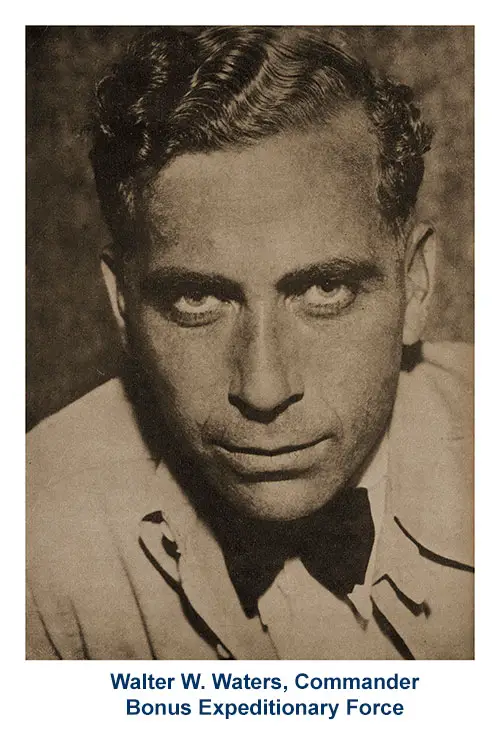Walter W. Waters, Commander of the Bonus Expeditionary Force - 1932

Walter W. Waters, Commander of the Bonus Expeditionary Force, circa 1931. GGA Image ID # 186ec09b87
In the following memoir, World War I veteran W.W. Waters recalls the high unemployment and low morale he witnessed on the streets of Portland, Oregon, during the first years of the Great Depression.
Facing a similar situation himself, Waters was a founding member of the Bonus Expeditionary Force, a collective of veterans who marched from Oregon to Washington D.C. in the spring of 1932 demanding immediate payment of their war bonuses.
In my ceaseless beating about the city I found family after family in the same general condition or worse. I saw men half clad, in threadbare clothing, pacing the streets in soleless shoes.
On their faces was the same look, part of hope, part of bewilderment, as they searched for a chance to earn a few dollars at honest work. I talked with hundreds of these men and found that, with few exceptions, they wanted not charity but work that would enable them to live and to regain their self-respect…
These men did think and talk a great deal about the so-called Bonus. The name “Bonus” is unfortunate. It is not a gift, as the word implies. It is a payment of money to compensate those men who served in the Army for the difference in pay between that of service men and non-service men in 1918.
The bill, asking payment in full of the adjusted compensation for wartime service, was introduced by Representative Patman of Texas and, during the early winter of 1931, was pending in Congress. The majority of veterans were hoping that it would pass.
These men had fallen far down into the valley of despair. Some push was necessary to start them out and up over the hill. Jobs would have provided the best sort of impetus but there were no jobs. The Bonus, a lump sum of money, could act in the same fashion. Debts could be met, doctors’ bills paid, a fast-fraying credit renewed, and one man could look another in the eye once more…
The point, continually forgotten, is that the Bonus in these men’s minds became a substitute or a symbol for that long dreamt of new start, a job. These men had nothing to which to look forward except to the shiny shoulders of the man in front of them in the breadline. Whenever I asked these men which they would rather have, the Bonus or a job, the replay was nearly always the same: “A job, of course. But where’s a job coming from? I’ve looked every day for over a year and haven’t found one.”
Walter Waters - The Man Credited with the Bonus Army's Idea
Walter Waters is the man credited with the Bonus Army's idea and its march on Washington, D.C. Waters, of Portland, Oregon, had served in France during the First World War, with the 146th Field Artillery.
After his military service ended, he had many different jobs and finally worked his way up to assistant superintendent at a cannery near Portland.
He was married with two children, owned a car and a home, and had a thousand dollars in savings. He was laid off from the cannery in December 1930, a little over a year after the stock market crash.
By March of 1932, having been unable to find work and his savings dwindling, he was nearly destitute. On March 15, at a National Veterans Association meeting in Portland, he declared that they should take a freight train to Washington and demand the bonus money.
In 1924 Congress passed the Adjusted Compensation Act to reimburse servicemen for the time they had spent away from home and high-paying wartime jobs during World War I.
The Act required the government to give each man an endowment insurance policy cashable twenty years after its 1925 issuance, in 1945.
The average sum was around five hundred dollars with four percent interest added to this would by 1945 result in a cash-in value of about one thousand dollars.
When a band of jobless veterans, led by a former cannery worker named Walter W. Walters, began arriving in the capital in May, tensions were high.
Calling themselves the "Bonus Expeditionary Forces," they demanded early payment of a bonus Congress had promised them for their service in World War I.
According to journalist and eyewitness Joseph C. Harsch, "This was not a revolutionary situation. This was a bunch of people in great distress wanting help.... These were simply veterans from World War I who were out of luck, out of money, and wanted to get their bonus -- and they needed the money at that moment."
In 1936, Congress finally passed a bill over President Roosevelt's veto. The Bonus Army had achieved its objective. Perhaps more importantly, they forced the nation to take notice.
According to writers Allen and Dickson, the "magnificent legacy" of the Bonus Army is the 1944 GI Bill, which provided education benefits and housing loans to returning World War II vets.
W. W. Waters and William C. White, B.E.F. The Whole Story of The Bonus Army (New York: The John Day Company, 1933) (Extracts)
